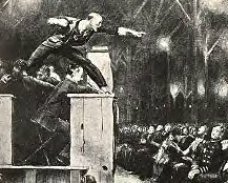 With wine on the mind, I thought I would discuss the interesting role of Thomas B. Welch in the controversy concerning the use of alcohol.
With wine on the mind, I thought I would discuss the interesting role of Thomas B. Welch in the controversy concerning the use of alcohol.
Thomas Welch is remembered as the inventor of modern grape juice. He applied Louis Pasteur’s new pasteurization process to grapes: the result was unfermented wine better known as grape juice. But what many do not know is that Welch had a specific reason for experimenting with grape juice. He was a minister who objected to alcoholic wine being used for communion. So much so, in fact that he refused to touch it even though he had been elected communion steward. After developing his unfermented communion alternative, he tried, unsuccessfully to substitute it in his church’s communion. Eventually, however, he convinced his church and many others to use the unfermented wine, furthering his temperance movement cause. The family business soon grew and his son Charles E. Welch developed the business into the large company it is today.
So there you have it. A centuries long practice of using alcoholic wine in communion is overturned by a prohibitionist and profiteer. To substantiate my history claims above look no further than Welch’s own company history. At the bottom of this article there are further resources.
Now I do not want this article to say too much. I definitely want to be fair and honest in my presentation of the facts. For instance, it appears that Welch was moved more by conviction than capitalism (at least initially). And also the fact that Welch invented the modern method of preserving grape juice does not imply that there were no other methods prior to 1869. For instance the link provided here gives some documentation of ancient methods of preserving grape juice which may have been used in Bible times and after. I am not advocating that every instance of the word wine in the Bible must only be understood as alcoholic wine. However, in my research I believe there are numerous places where the Bible affirms the intoxicating nature of wine (thus fermented wine) as a gift of God, see my first post on the topic here.
The link provided above goes on to cite evidence that unfermented wine was the normal practice of the early church. While I have not looked into all that evidence closely, I do believe there is plenty of evidence to the contrary. For instance Keith Mathison claims that fermented wine was the universal custom of the church for 1800 years, see this link to a pertinent excerpt from his book Given for You: Reclaiming Calvin’s Doctrine of the Lord’s Supper. History unequivocally testifies that from 1500 until the late 1800s it was universal practice among Catholic, Protestant, and Anabaptist groups to use alcoholic wine in communion and daily life. It should be startling, therefore, to learn that the prohibition movement and a particular representative of it, Thomas Welch, were extremely instrumental in changing that consensus into the great controversy of the present. Today, many churches and even entire denominations decry any use of alcohol and act as if this has always been the position of God’s church.
Before I close, let me briefly discuss the prohibition movement. The movement was spawned from a worldly wisdom not a Christian belief system: the church joined the bandwagon of the secular movement, not vice versa. This claim is easily substantiated through basic research. I encourage you to peruse this article to gain an understanding of the previous widespread consumption in America and the birth of Prohibition. The article goes on to document the underhanded tactics used by the prohibitionists. They censored school textbooks and paraded pure fallacies as documented fact. Also of note is prohibition’s view that alcohol was bad and that which inherently caused drunkenness and alcoholism. They saw many of the problems of society traced to the disease of alcoholism with alcohol as the culprit. In this focus the movement practically denied the Biblical contention that what is inside a man defiles him, not what comes into him. They thought society could be cured of its evils by purging it of alcohol, but society is only cured through its submission to the Lordship of Christ.
When anyone wants to develop a position on alcohol and hopes to prove whether or not Scripture permits its use they must not ignore the facts presented here. Failing to admit that the practice and doctrine of churches were influenced by the secular temperance movement will not permit the investigator to understand that he may be severely prejudiced through his own church traditions of the past one hundred or more years. In this discussion, therefore, it is vital to remember the role Thomas Welch and the worldly wise temperance movement made in the history of the church and its views concerning wine.
Resources and Documentation:
Welch’s Grape Juice
- Wikipedia article on Thomas Welch
- Wikipedia article on Grape Juice
- United Methodist Church History documenting Welch’s influence on changing to using grape juice for communion
- Christianity Today brief mention of Welch and his influence
- Brief article by American Vision entitled “Turning Wine into Grape Juice”
- Detailed Obituary of Thomas Welch and his efforts to introduce Grape Juice into Churches for communion use
Prohibition
- Detailed article on the history of Prohibition in the US — notes the widespread use of alcohol prior to the beginning of prohibition
- Article detailing views of drunkenness prior, during, and after the prohibition — showcases Puritan preachers views of drunkenness and also shows how prohibition blamed alcohol as the cause of alcoholism
- Wikipedia article on the American Temperance Movement
picture borrowed from here
∼striving for the unity of the faith for the glory of God∼ Eph. 4:3,13 “¢ Rom. 15:5-7
 Independent Fundamental Baptists love preaching! And when I say preaching, I mean hell-fire and brimstone, Bible-waving, Satan-trouncing PREACHING! Amen? The best preaching is usually accompanined by the most screaming, hollering, spitting, snorting, and a good dose of preaching “antics”.
Independent Fundamental Baptists love preaching! And when I say preaching, I mean hell-fire and brimstone, Bible-waving, Satan-trouncing PREACHING! Amen? The best preaching is usually accompanined by the most screaming, hollering, spitting, snorting, and a good dose of preaching “antics”. Now another aspect of the kind of preaching fundamentalists savored was what is called toe-stomping. Yes, if you are thinking of the image of someone stomping on your toes–that is what is meant. It seems the preachers job was to make us feel guilty about all of our failures. If we really felt like he had put us through the ringer, so to speak, it was thought the preacher had really done his job well. This is why a full altar meant a great sermon. When all kinds of people felt the weight of their guilt to the point of coming forward and “getting things right” with God, the preacher had done his job well. No pain, no gain! Amen?
Now another aspect of the kind of preaching fundamentalists savored was what is called toe-stomping. Yes, if you are thinking of the image of someone stomping on your toes–that is what is meant. It seems the preachers job was to make us feel guilty about all of our failures. If we really felt like he had put us through the ringer, so to speak, it was thought the preacher had really done his job well. This is why a full altar meant a great sermon. When all kinds of people felt the weight of their guilt to the point of coming forward and “getting things right” with God, the preacher had done his job well. No pain, no gain! Amen?